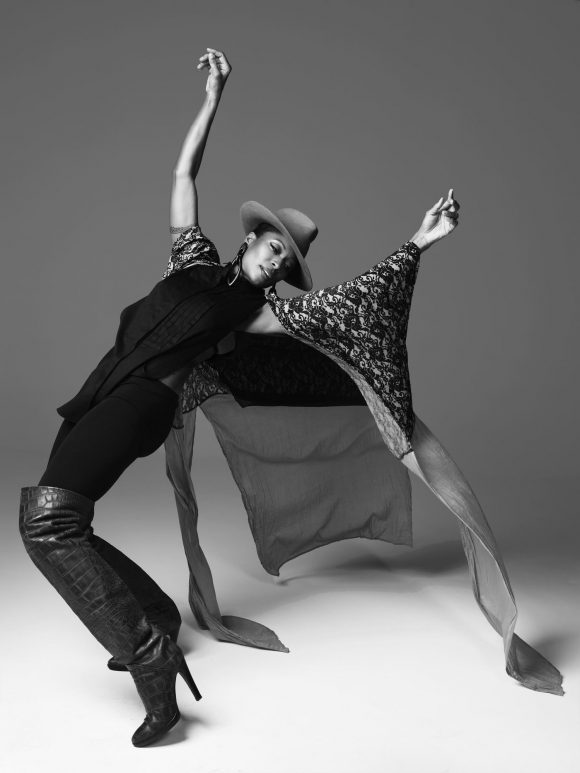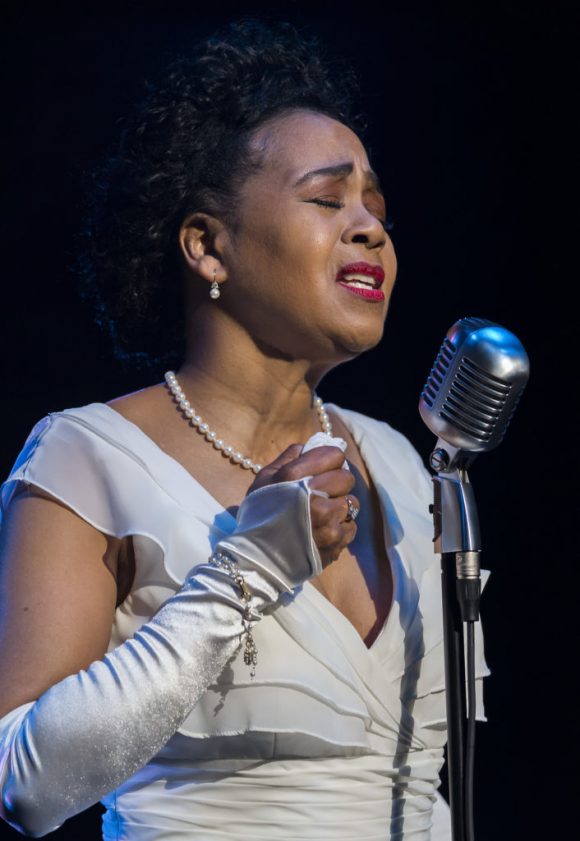Fall 2020 CoPA Conscious Speaker Series Industry Lessons from Fatima Robinson, Darnell Abraham, and Karole Foreman
December 14, 2020
This semester, College of Performing Arts (CoPA) students enjoyed the opportunity to work with three esteemed industry professionals as part of our newly launched CoPA Conscious Speaker Series, which aims to celebrate the talent of BIPOC artists allow allow the Chapman community to hear and learn from diverse perspectives. The series was spearheaded by Dr. Louise Thomas, associate dean for academic affairs, in response to student feedback about ways CoPA can create a more diverse, equitable, and inclusive learning environment. Dance, music, and theatre students logged on to Zoom to get career advice from groundbreaking choreographer Fatima Robinson, powerhouse singer Darnell Abraham, and vibrant actor Karole Foreman. Robinson, Abraham, and Foreman spoke candidly about their experiences navigating the performing arts and entertainment industries and shared invaluable advice with students about how to build sustainable, meaningful, creative careers.
Fatima Robinson
 Fatima Robinson, one of Entertainment Weekly’s “100 Most Creative People in Entertainment,” is an acclaimed choreographer known for her ability to blend classic dance-styles with her distinct hip hop flavor. Her choreography is featured in countless movies, tv shows, music videos, stage productions, and commercials including NBC’s The Wiz Live!, Dreamgirls, Will Pharrell’s “Happy,” and Michael Jackson’s “Remember the Time.” Robinson joined us on October 9th for an interactive Q&A session with the CoPA community, after which she stuck around for a virtual technique masterclass for dance students featuring her choreography from Black Eyed Peas’ “MAMACITA.” The day’s events concluded with an opportunity for advanced choreography students to workshop their own material with Robinson. In the Q&A, Robinson described the unique shape of her career, which started by dancing in clubs when hip hop was still emerging as a form. “Clubs were my classroom,” said Robinson, who was determined to follow her passion for dance and transform her hobby into her career, even when others didn’t think it was possible. Robinson described how happy she is to see how far hip hop has come over the years, since her goal early on had been “for people to look at hip hop dance as a true art form.” Robinson also offered several tidbits of practical advice to aspiring dancers and choreographers, encouraging students to make the most of their time in college to focus on honing their skill and craft. As an accomplished multi-hyphenate with a knack for problem-solving, Robinson also emphasized the importance of cultivating a diverse range of complementary skills, such as acting and design. Finally, Robinson encouraged students to think broadly about opportunities connected to dance in other areas of the industry, asserting that dancers make excellent employees in any field: “What dance teaches you is a certain discipline in life, that is ingrained in you. Whenever you hire a dancer you’re going to get a great person because they are on their game.”
Fatima Robinson, one of Entertainment Weekly’s “100 Most Creative People in Entertainment,” is an acclaimed choreographer known for her ability to blend classic dance-styles with her distinct hip hop flavor. Her choreography is featured in countless movies, tv shows, music videos, stage productions, and commercials including NBC’s The Wiz Live!, Dreamgirls, Will Pharrell’s “Happy,” and Michael Jackson’s “Remember the Time.” Robinson joined us on October 9th for an interactive Q&A session with the CoPA community, after which she stuck around for a virtual technique masterclass for dance students featuring her choreography from Black Eyed Peas’ “MAMACITA.” The day’s events concluded with an opportunity for advanced choreography students to workshop their own material with Robinson. In the Q&A, Robinson described the unique shape of her career, which started by dancing in clubs when hip hop was still emerging as a form. “Clubs were my classroom,” said Robinson, who was determined to follow her passion for dance and transform her hobby into her career, even when others didn’t think it was possible. Robinson described how happy she is to see how far hip hop has come over the years, since her goal early on had been “for people to look at hip hop dance as a true art form.” Robinson also offered several tidbits of practical advice to aspiring dancers and choreographers, encouraging students to make the most of their time in college to focus on honing their skill and craft. As an accomplished multi-hyphenate with a knack for problem-solving, Robinson also emphasized the importance of cultivating a diverse range of complementary skills, such as acting and design. Finally, Robinson encouraged students to think broadly about opportunities connected to dance in other areas of the industry, asserting that dancers make excellent employees in any field: “What dance teaches you is a certain discipline in life, that is ingrained in you. Whenever you hire a dancer you’re going to get a great person because they are on their game.”
 Darnell Abraham
Darnell Abraham
Our next guest artist was Darnell Abraham, a versatile vocalist celebrated for his performances spanning musical theater, soul, R&B, and opera. Abraham joined us on October 29th for a moderated discussion, series of masterclass sessions, and Q&A. To begin, Abraham spoke at length about his experiences in the roles of George Washington in the #AndPeggyTour of Hamilton, and Coalhouse Walker, Jr., which he has performed in multiple productions of Ragtime. Abraham described Washington as a dream role for him, and spoke with candor about his journey navigating what it meant as a Black actor to portray the white, historical figure. Abraham explained how the concept of uncommon justice helped him approach the role: “As a descendant of those who were once enslaved and made to be silent, this is an opportunity for me to honor them and stand on their shoulders.” During the masterclass portion of the evening, Abraham focused on coaching students to infuse their singing with emotion through the use of acting skills. “Acting and singing are one and the same,” he said, “because at the end of the day they’re both forms of communication.” With Abraham’s guidance, Erica Marfo (’20) added elements of vulnerability and resolute strength to her performance of “The Past Is Another Land” from Aida; Noah Fletcher (’21) sharpened his comic timing in “In Love With You” from First Date; and Clara Chung (’22) conveyed yearning and earnestness in “In My Dreams” from Anastasia. In the final portion of the evening, Abraham answered student questions and shared invaluable logistical details about his experience breaking in to musical theatre and what the process of getting an agent, joining Actor’s Equity, and being cast in a major musical actually looked like. Emphasizing the importance of networking in the performing arts, Abraham pointed out how many of his professional opportunities have come through the community he built during college. Ending where the evening began, Abraham responded to questions about how to prioritize diversity, equity, and inclusion efforts in professional and educational settings: “This is an exciting time for us to help guide our institutions into a new chapter of enlightenment and inclusion. There are chapters waiting to be written. And the pen is in our hand. So what will we write in these chapters?”
Karole Foreman
 Karole Foreman joined us on December 4th for the final event in the semester’s speaker series. Foreman is a passionate performer, teacher, playwright, and director with an long acting career across stage and screen. Earlier this year, she starred as Billie Holiday in Ebony Repertory Theatre’s production of Lady Day at Emerson’s Bar and Grill. For two hours, Foreman engaged in warm and open conversation with CoPA students and faculty about pursuing a career in acting, what she has learned along the way, advice for students of color, and how she prepared for the role of Billie Holiday. Foreman offered a glimpse into how she approaches her craft, describing the importance of research and how she prepares for a role by reading the script multiple times, each time looking for something new or asking a new set of questions. The conversation produced a wealth of practical tips for young actors, such as creating a list of dream roles and starting to research them now, learning how to sing, continuing to take acting classes and pursue training throughout your entire career, doing trial runs in different cities, and taking advantage of time between gigs to rest, recover, and pursue interests outside of acting. On navigating a tough industry as a person of color, Foreman — who is currently flexing her creative muscles developing a new musical — advised students to collaborate with one another and create the opportunities they don’t currently see to “show people a different way.” Foreman reflected on current conversations about diversity, equity, and inclusion in the industry and how much has changed over the course of her career, encouraging early-career actors to consider their values when making career decisions. “I really hope that you’re always in a position where you feel you have the financial resources to not take a job,” she said, “but also the opportunity to step back and think, ‘Is this what I want to contribute to the culture?’ You’re really positioned now at a young age to say, ‘This is my artistry,’ and to really define your values as an artist even before you even head out the gate.”
Karole Foreman joined us on December 4th for the final event in the semester’s speaker series. Foreman is a passionate performer, teacher, playwright, and director with an long acting career across stage and screen. Earlier this year, she starred as Billie Holiday in Ebony Repertory Theatre’s production of Lady Day at Emerson’s Bar and Grill. For two hours, Foreman engaged in warm and open conversation with CoPA students and faculty about pursuing a career in acting, what she has learned along the way, advice for students of color, and how she prepared for the role of Billie Holiday. Foreman offered a glimpse into how she approaches her craft, describing the importance of research and how she prepares for a role by reading the script multiple times, each time looking for something new or asking a new set of questions. The conversation produced a wealth of practical tips for young actors, such as creating a list of dream roles and starting to research them now, learning how to sing, continuing to take acting classes and pursue training throughout your entire career, doing trial runs in different cities, and taking advantage of time between gigs to rest, recover, and pursue interests outside of acting. On navigating a tough industry as a person of color, Foreman — who is currently flexing her creative muscles developing a new musical — advised students to collaborate with one another and create the opportunities they don’t currently see to “show people a different way.” Foreman reflected on current conversations about diversity, equity, and inclusion in the industry and how much has changed over the course of her career, encouraging early-career actors to consider their values when making career decisions. “I really hope that you’re always in a position where you feel you have the financial resources to not take a job,” she said, “but also the opportunity to step back and think, ‘Is this what I want to contribute to the culture?’ You’re really positioned now at a young age to say, ‘This is my artistry,’ and to really define your values as an artist even before you even head out the gate.”
Taken together, several shared themes emerged from the conversations with all three artists. CoPA students preparing for careers in the performing arts will do well to follow your passions, know what matters to you, rely on and take care of your community, and cultivate complementary and interdisciplinary skills. As plans for a Spring 2021 CoPA Conscious Speaker Series are under way, we look forward to continuing these fruitful conversations and offering these invaluable opportunities to our CoPA community.
—
Speaker comments have been edited lightly for length and clarity.


